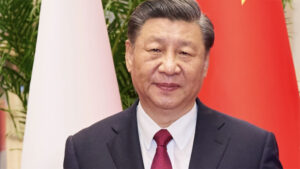We’re continuing our conversation on China’s inability to govern itself, and this is the cherry on top of it all…China restricting the export of metals used in greentech and semiconductor tech to the United States.
If you’ve followed along for a while, you know that the US doesn’t have to worry about rare earths, but Germanium and Gallium don’t fall into that category. Spoiler alert – I’m not too worried about these either.
While the Chinese may dominate the production of these metals, it can be attributed to subsidies and no one else wanting to do the ‘dirty’ work. There’s nothing uber challenging about the process; it just requires someone that’s willing to get their hands dirty.
As the bilateral relationship with China grows more hostile by the day, knee-jerk reactions like this material export ban will do nothing but encourage Americans of all political stripes to cut ties. Ironically, China has become the biggest promoter of the US moving as fast and far away from Chinese dependency as possible.
If the Chinese really want to start a material input war, they might as well start the countdown sequence because they would be f****d.
Prefer to read the transcript of the video? Click here
Here at Zeihan On Geopolitics we select a single charity to sponsor. We have two criteria:
First, we look across the world and use our skill sets to identify where the needs are most acute. Second, we look for an institution with preexisting networks for both materials gathering and aid distribution. That way we know every cent of our donation is not simply going directly to where help is needed most, but our donations serve as a force multiplier for a system already in existence. Then we give what we can.
Today, our chosen charity is a group called Medshare, which provides emergency medical services to communities in need, with a very heavy emphasis on locations facing acute crises. Medshare operates right in the thick of it. Until future notice, every cent we earn from every book we sell in every format through every retailer is going to Medshare’s Ukraine fund.
And then there’s you.
Our newsletters and videologues are not only free, they will always be free. We also will never share your contact information with anyone. All we ask is that if you find one of our releases in any way useful, that you make a donation to Medshare. Over one third of Ukraine’s pre-war population has either been forced from their homes, kidnapped and shipped to Russia, or is trying to survive in occupied lands. This is our way to help who we can. Please, join us.
CLICK HERE TO SUPPORT MEDSHARE’S UKRAINE FUND
CLICK HERE TO SUPPORT MEDSHARE’S EFFORTS GLOBALLY
TRANSCIPT
Hey, everybody. Peter Zaillian here. Coming to you from extremely foggy, Colorado. We are continuing kind of a two part one here and something that’s going on with the Chinese and their inability to govern or enter in negotiations. So the new news from the 5th of July is that the Chinese are restricting exports of a couple of materials to the United States, materials that are used in green technologies and semiconductor industry, specifically germanium and gallium.
Now, for those of you who’ve been following me for a while, you know that when it comes to things like rare earths, I’m really not concerned because all we have to do is kind of turn on the processing, the capacity that we’ve already built. And then within a few months, the Chinese suppliers don’t matter at all. This doesn’t fall into that category. Gallium and germanium are not rare earths. They’re co-produced with other or so. It’s not that the extraction is particularly difficult, but this is something where we would have to build up the processing capacity first before we can get around this being a problem. I still don’t think it’s a major problem for two reasons. Number one, for people who are willing to admit something that’s becoming increasingly obvious, the bilateral relationship between the United States and China is hostile.
It’s becoming more hostile by the second and the incapacity of the Chinese system to even enter into meaningful negotiations means it’s only going to get worse. You know, part of the issue is that Chairman Ji has so purged the system that China is not even capable any longer having good faith negotiations. And even if it was capable of good faith, it couldn’t handle the technical details because Chairman, she would have to do it personally and they would have to implement it personally because he’s purged the system throughout China of anyone who is even marginally competent. So the capacity of China to even act as an actor, much less a good faith actor, is pretty much fallen away. Which leaves us with things like this germanium and gallium band, because this is like knee jerk grade D-minus, not even freshman level economic coercion. The Chinese said flat out that this was a hostile move designed to punish the United States and that more was coming.
But when you look at what’s going on, you’ll see that it’s not something to be all that worried about. Now, Germany and gallium, the Chinese, based on whose numbers you’re using, produce between 50 and 80% of those two materials. And yes, the United States does have a weakness in terms of processing and access, but a few things to keep in mind. First of all, germanium is a byproduct of zinc mining and zinc refining, and zinc production globally is pretty robust. Yes, the Chinese are the biggest player, but they’re also the biggest user. So if you were simply to add some processing capacity at a half a dozen places around the world, maybe a couple of the United States would be nice. That would solve itself. Gallium is a byproduct of aluminum production, specifically the first stop of aluminum production where you turn bauxite into alumina. That is also done in a number of places. The reason that the Chinese dominate the production of these two micro materials is that it’s a little dirty. And so the Chinese have to subsidize the production about specific sets. There’s nothing expensive or technologically competent or even particularly time consuming about building replacement capacity. And so we might have some pressure for a few weeks to a few months as people kind of sink in how serious the Chinese are or not about these bans. But replacing those materials is not particularly hard. Second, I would argue that this is a good thing that the Chinese are using a complete lowball flunky, incompetent measure of intimidation because, you know, Americans are going to blow this out of proportion. Things like the IRA and the CHIPS Act were rare. And for a third one that is specifically about strategic materials production, and this plays right into that political drama. You’ll have Democrats and Republicans falling over each other in order to put the money forward and put in regulations to encourage these productions within the North American system of the Chinese have really proven to be very helpful in that. And third, and most importantly, if the Chinese really are serious about an input war, oh my God, they are fucked because 90% of the world’s semiconductor sector capable silicon comes from North freakin Carolina. And so if we’re really talking about a materials war as part of the struggle for the digital age, they’re not going to have computers because they can’t get access to the raw materials that are necessary in mass to make the most basic technologies that make air run, and that’s semiconductors.
So this is not something where the Chinese have any more than a passing advantage on a couple of micro materials that are easily to produce in other places. And by doing this in this way, in this in-your-face wolf warrior way for something that ultimately is easily replaceable, is probably the most effective way that I can think of, of getting the United States past dependency on the Chinese in general and honestly destroying the tech sector in its entirety.
Now, there’s some political decisions that have to be made in the United States on both sides of the aisle, on Capitol Hill, in the White House, and on and on and on. But the United States is in the mood for this, the competence discussion now that we’re entering political season for the next election cycle, is who can be most anti-Chinese? It’s just a question of whether or not you’re going for hopefully or were derisking or reinforcing. I mean, everyone has their own preferred term, but the bottom line for almost everyone is how to end the dependency. And the Chinese are really being very helpful in encouraging us to move that forward.
Alright. That’s it. Take care.







